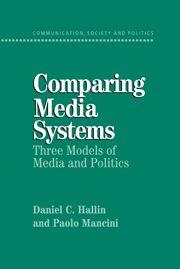Book contents
- Frontmatter
- Contents
- List of Figures and Tables
- List of Acronyms
- Preface
- 1 Introduction
- Part I Concepts and Models
- 2 Comparing Media Systems
- 3 The Political Context of Media Systems
- 4 Media and Political Systems, and the Question of Differentiation
- Part II The Three Models
- Part III The Future of the Three Models
- Bibliography
- Index
4 - Media and Political Systems, and the Question of Differentiation
Published online by Cambridge University Press: 05 September 2012
- Frontmatter
- Contents
- List of Figures and Tables
- List of Acronyms
- Preface
- 1 Introduction
- Part I Concepts and Models
- 2 Comparing Media Systems
- 3 The Political Context of Media Systems
- 4 Media and Political Systems, and the Question of Differentiation
- Part II The Three Models
- Part III The Future of the Three Models
- Bibliography
- Index
Summary
In Chapters 2 and 3 we introduced a framework for comparing media systems and a set of concepts adapted from comparative politics and political sociology that, we argued, have important relationships with the media system. In Chapter 3 we also introduced a number of hypotheses about how particular political system variables were related with particular media system variables. In the remainder of this book, we will try to analyze these relationships in a more synthetic and historical way, exploring the broader patterns of relationship that have developed in North America and Western Europe; the reasons why particular sets of characteristics have tended to co-occur; and why these patterns occur when and where they do. This chapter will begin this process of analysis, first, by introducing three models of the relation between media and political systems that will organize our empirical discussion of the media systems of particular countries, and second, by posing the question whether the patterns observed here can be understood in terms of differentiation theory. The discussion of differentiation theory will lead us into a deeper look at an issue posed in the introduction to this volume, the use of the Liberal Model as a standard for measuring media systems; it will also carry us forward to a discussion, in Chapter 8, of convergence or homogenization of media systems, and whether this can be understood as a process of “modernization.
Information
- Type
- Chapter
- Information
- Comparing Media SystemsThree Models of Media and Politics, pp. 66 - 86Publisher: Cambridge University PressPrint publication year: 2004
Accessibility standard: Unknown
Why this information is here
This section outlines the accessibility features of this content - including support for screen readers, full keyboard navigation and high-contrast display options. This may not be relevant for you.Accessibility Information
- 2
- Cited by
